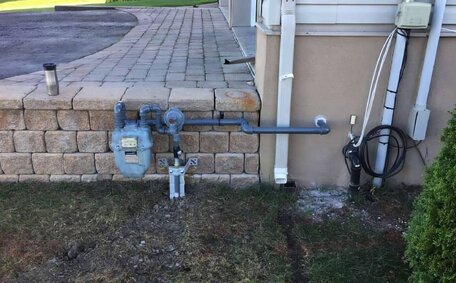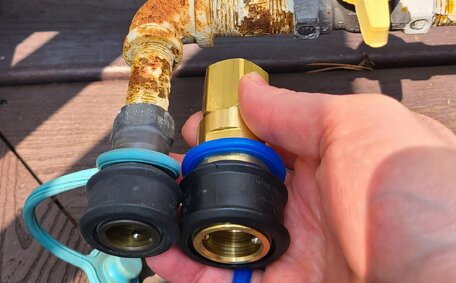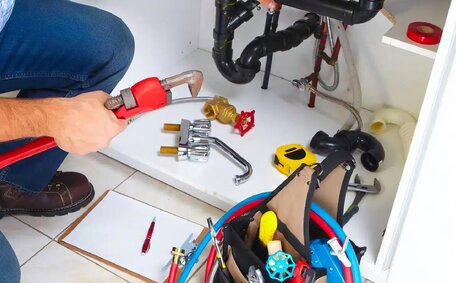Introduction to Preventing Blocked Drains
Blocked drains are a common issue that can cause major headaches if left unchecked. When it comes to unblocking drains, Marsfield Plumbing specialises in techniques using state-of-the-art equipment. However, while seeking professional plumbing services is sometimes necessary, understanding and applying regular care to prevent blocked drains is often more effective.
This guide will provide practical tips and DIY solutions for maintaining clear and functional drains. We’ll explore the causes of blocked drains, early warning signs, and eco-conscious methods you can apply at home to prevent emergencies.
Following our preventative maintenance advice will help you avoid occurrences that can damage your plumbing, such as backed-up water and pipes, foul odours, flooding, and the expense of professional drain cleanings. We aim to empower you to handle basic drain care on your own.
Read on to learn key strategies such as:
- Utilising common kitchen items, like vinegar, baking soda, and heated water, to dissolve drain blockages
- Fitting strainers and screens to capture debris
- Recognising how hair, soap residue, fats, oils, and tree roots contribute to blockages
- Identifying the right time to engage a professional for specialised drain care
Equipped with this knowledge, you can keep your property’s drains clear and your plumbing system operating efficiently for years to come.
Understanding Common Causes of Blocked Drains
Blocked drains often originate from household items and substances that accumulate inside pipes over time. One of the most common culprits includes:
Food Waste and Grease
Food scraps, cooking oil, and grease are frequent culprits that can clog your kitchen drain. Fats, oils, and grease that cool and solidify in your pipes are primary contributors to blockages. Small bits of food waste can also accumulate.
Hair
Your bathroom showers and bathroom sinks can quickly end up clogged with hair. As strands collect, drains can become obstructed by the thick blockage created by trapped debris and soap scum.
Soap Scum
Oil and grease from soap, shampoo, and other bath products create sticky scum that can lead to a clogged drain as water evaporates. This scummy residue adheres to other materials, accumulating into blockages that can gradually clog your pipes.
Tree Roots
A blocked drain can occur when invasive tree roots break through underground drainage pipes, causing broken pipes that risk damaging your sewer system. Tree roots can grow within pipes, causing blockages that eventually prevent water from draining.
Understanding the common causes of blocked drains helps you adopt proactive drain maintenance strategies. Adopting simple habits, such as employing drain screens, reducing oil and grease disposal, and regular plunger use, can prevent the majority of clogs.
Keeping Drains Clear Through Regular Maintenance
Implementing regular drain maintenance into your household routine is one of the most effective ways to prevent blockages. Routine inspections and altering kitchen habits to prevent the accumulation of debris, fats, oils, and other substances will reduce the risk of drain blockages.
Inspect and Clean All Drains Weekly
Weekly visual inspections of your sinks, showers, and baths are essential to detect early signs of blockage. Remove any debris, hair or soap scum that gets washed down into the drains. Regularly clean your drain strainers and filters in hot water to keep them operating effectively.
Install Hair Catchers
Use hair catchers or drain screens over plugholes to capture hair before it enters the pipes. Models with suction cups stick firmly, which help prevent blocked pathways due to hair accumulation. Regularly remove hair from catchers to prevent buildup.
Limit Grease and Food Waste
Scrape plates and pans to remove grease, soap residue, and leftover food bits before they get washed into the drain. Never pour large volumes of oil or grease down the toilet or sink to avoid clogging. Compost food scraps, which can include coffee grounds, whenever possible to prevent drain clogs.
Making drain care part of your kitchen’s weekly cleaning routine takes little effort. Such practices not only prevent emergency blockages but also help eliminate odours and maintain consistent drain flow.
Using Natural, Non-Toxic DIY Drain Solutions
There are several eco-friendly, non-toxic DIY methods you can try using at home to help clear minor drain blockages and prevent future clogs from forming without relying on harsh chemicals.
Baking Soda and Vinegar
Tackle clogs using a highly effective homemade cleaner made from baking soda and vinegar. Here’s your guide for clearing a blocked drain using this dynamic eco-friendly combination:
- Start by pouring half a cup of baking soda down the drain to begin the cleaning process.
- Next, add one cup of white vinegar. The resulting fizzing reaction will help break down debris.
- Cover the drain, allowing the mixture to sit for an hour, then rinse through to maximise the cleaning reaction.
- Finally, rinse the drain with boiling water to wash away any residual debris.
This weekly treatment is more effective than chemical cleaners for removing soap scum and maintaining unobstructed pipes.
Boiling Water
Boiling water acts as a natural drain cleaner, highly effective for melting fatty oils and grease that collect in kitchen drains. Pouring 4-6 cups of boiling water down your drain weekly maintains clear water flow and prevents blockages. Pouring the boiling water cautiously and slowly not only safeguards against burns but also aids in preventing drain blockages by managing the water’s distribution.
Also, run very hot tap water for a minute afterward to flush any lingering grease and ensure water flows freely down the drain. The heat from boiling water is one method of how prevent residues from forming, as it can help clear them without using caustic chemicals.
DIY Drain Snake
A homemade coat hanger drain snake can mechanically pull out hair and gunk where clogs form. To make one, securely attach a wire hanger to the end of a cup plunger handle for your DIY drain-cleaning tool.
Carefully insert the hanger drain tool down the drain, moving gently to hook debris. Slowly pull out to remove it.
Natural drain care, functioning as a natural cleaner, not only saves money on plumbing calls but keeps your home ecologically friendly.
Implementing Proactive Blockage Prevention Strategies
Being proactive with maintenance can be the best strategy to steer clear of costly repairs associated with any plumbing issue such as clogged drains. By making small adjustments to your household habits, you learn how to clear blocked drains before debris and buildup ever form.
Use Drain Strainers and Screens
Placing drain strainers over your shower drain, as well as all sink and tub drains, prevents hair and debris from entering pipes. Routinely cleaning strainers ensures debris doesn’t accumulate. Hair catchers with suction cups are convenient for grabbing strands after bathing.
Preventative Pipe Flushing
Make it a weekly habit to flush your kitchen and bathroom drains with hot water to preclude clog formation. Regularly flushing with boiling water can dissolve hardened grease and oil, keeping debris at bay and drains unblocked. Continue by taking steps to pour down hot water for a minute to effectively wash away any lingering grease.
Proper Waste Disposal
Clear plates of oily and fatty foods prior to washing. Avoid pouring large volumes of oil or grease down kitchen sinks. Compost food waste when possible or discard with general rubbish.
Use Baking Soda and Vinegar
Combining baking soda and vinegar creates a chemical reaction that assists in clearing blocked pathways by breaking down organic materials. Flush your pipes preventatively each month by pouring a salt and baking soda mixture down drains. Let sit and bubble for an hour before rinsing with very hot water.
Being vigilant with simple maintenance habits will keep your drains free of obstructions. If problems do occur, our team of professional plumbers can swiftly manage and resolve even the most severe blockages.
Knowing When Professional Help is Needed
While regular drain maintenance and natural home remedies can prevent and clear minor clogs, certain signs blocked drain situations indicate professional help is required:
- Water backing up from multiple drains
- Bad odours coming from drains
- Visible water damage around pipes
- Sinks and tubs draining slowly
- Gurgling sounds from toilet or sinks
If you encounter these problems with your drains, call us at Marsfield Plumbing without delay. With professional expertise and advanced equipment, such as hydro jetting, our team can effectively clear severe blockages and inspect for sewer system damage. We are your local experts, based in Marsfield, Sydney, and provide a full range of residential and commercial plumbing services 24/7.
Don’t wait for minor problems to escalate. Phone 1300 349 338, email jobs@marsfieldplumbingservices.com.au or book an appointment to have one of our specialists diagnose your blocked drains today.






